Yes, Wolfram Workbench does have a profiler, although according to the documentation the output isn't quite in the form you want.
I should note that the issue raised by Mr.Wizard in comments - that cached results will lead to different timing results - can also apply in profile.
If you wanted to do something exclusively in Mathematica, you could try something like:
myProfile[fun_Symbol,inputs_List]:=
TableForm[#[[{1,3,2}]]&/@ (Join @@@ ({Timing[f[#]],#} & /@ inputs))]
If you were happy enough to have the output as {timing,output, input}, rather than {timing, input, output} as specified in your question, you could get rid of the #[[{1,3,2}]] bit.
EDIT
Since I have Workbench, here is an example. I have a package AdvancedPlots which includes a function CobwebPlot (and yes, the function itself could improved).
CobwebPlot[x_?MatrixQ, opts___Rule] /;
And @@ (NumericQ /@ Flatten[x]) :=
Module[{n, \[Theta]s, numgrids, grids, struts, gridstyle, min, max,
data, labels, epilabels, pad},
n = Length[First[x]];
\[Theta]s = (2 \[Pi])/n Range[0, n] + If[OddQ[n], \[Pi]/2, 0];
numgrids =
If[IntegerQ[#] && Positive[#], #,
NumberofGrids /.
Options[CobwebPlot] ] & @ (NumberofGrids /. {opts});
{min, max} = {Min[#], Max[#]} &@ Flatten[x];
gridstyle = GridStyle /. {opts} /. Options[CobwebPlot];
pad = CobwebPadding /. {opts} /. Options[CobwebPlot];
grids =
Outer[List, \[Theta]s, FindDivisions[{0, max + 1}, numgrids]];
struts = Transpose[grids];
labels = CobwebLabels /. {opts} /. Options[CobwebPlot];
epilabels =
If[Length[labels] == n,
Thread[Text[
labels, (1.2 max) Transpose[{Cos[Most[\[Theta]s]],
Sin[Most[\[Theta]s]]}]]], None];
data = Map[Reverse,
Inner[List, Join[#, {First[#]}] & /@ x, \[Theta]s, List], {2}];
Show[ListPolarPlot[grids, gridstyle, Joined -> True, Axes -> False,
PlotRangePadding -> pad],
ListPolarPlot[struts, gridstyle, Joined -> True, Axes -> False],
ListPolarPlot[data,
Sequence @@ FilterRules[{opts}, Options[ListPolarPlot]],
Sequence @@
FilterRules[Options[CobwebPlot], Options[ListPolarPlot]],
Joined -> True, Axes -> None] ,
If[Length[labels] == n, Graphics /@ epilabels,
Sequence @@ FilterRules[{opts}, Options[Graphics]] ]]
]
Running the package in Debug mode
And then running this notebook

Gives the following output.


